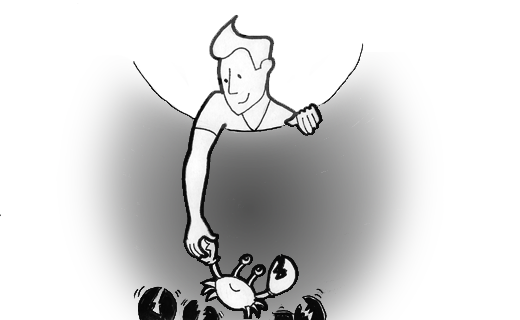The concept of ‘crab mentality’ comes from the behaviour of crabs in a bucket or pot. Any single crab could escape easily, but the others prevent it, and the whole group perishes. Used as a metaphor for human behaviour, crab mentality occurs when the group – whether through envy, spite or competitiveness – undermines and prevents the progress of any members who achieve more success than themselves. The thinking is “If I can’t, you can’t either.”
As a result of this dynamic, social change can be very hard to achieve. It takes a lot of effort and energy to break free from the ‘keep quiet and don’t rock the boat’ mentality of the crab pot. We might consciously disagree with many things the group thinks and does, but we feel too uncomfortable to speak up. It is so easy to be pulled back into the familiar crab pot, remaining silent about the issues in the world around us. The pullback is very strong, and the world outside seems too visceral and dangerous to go it alone.
Social conformity is a deeply primal thing. It’s a tractor beam, too overwhelming to escape. It is easier to numb yourself and disconnect from the world than face the pain of potential social rejection – just for being true to yourself.
In the hunter-gatherer era, remaining part of the tribe was a life or death issue. Our biology still connects us to that primal fear, which is why deviating from the norm can be so difficult. In areas of western privilege, speaking out is no longer a life or death issue, but at the subconscious level, we are still programmed to feel that it is.
To encourage more people to speak up, we need to be much more compassionate about people’s subconscious difficulty in doing so. Once people are more conscious of this psychological challenge and its effects, there may be a far smaller ‘silent majority’ in the world. A silent minority.
It is our silence that allows long-term injustice to exist and persist. However uncomfortable we may feel about the wrongs in the world, speaking out is even more uncomfortable. We are systematically and biologically trained to hide away from discomfort. We fall back in the crab pot. But if we stay there, we all perish.
Ultimately, we need safe, non-judgemental spaces for people to surface their views and to dialogue around them. It feels as if there aren’t too many of those around, these days. Otherwise, silence will remain the majority’s default until we address the collective and individual discomfort and provide safety around speaking up.
In these modern times, our survival depends on it.
Buy Me a Coffee
Did you love this article? If so please consider buying me a coffee.
Take The 50 Coffee Adventure
A Fun, Light and Easy Way to Build Connections
Or search your local Amazon store for "The 50 Coffee Adventure".

Fantastic post Marc, as always. I can certainly relate to this.
absolutely! self awareness and awareness of others is vital – but this is nothing new. we need practical steps, behavioural change – action. it starts with each and everyone of us. speak out about how you feel and dont criticise others – show them the way. start a conversation.
Good post buddy.
Black crab or white crab, though? That’s a genus question, not crustacean racism!
White crabs form a ladder to climb over each other and escape, then they collaborate to pull the last crab out of the bucket – so crab fishers have to place a lid with a rock on top, to contain their catch. Black crabs pull a potential escapee back into the bucket, imprisoning themselves without the need for a lid.
…think we’re overdue a virtual coffee, Mr?